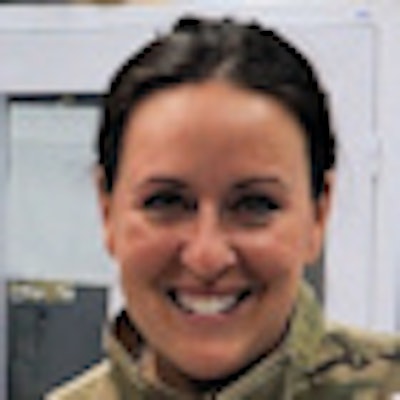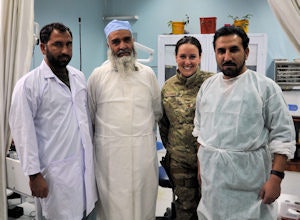
Inadequate supplies of anesthesia and other materials to treat patients in war-torn Afghanistan and working as a woman in a strictly male-dominated society are among the many challenges facing Air Force Maj. Courtney Schapira, DDS, who is serving in a military hospital that treats Afghan soldiers.
Dr. Schapira left her base in Charleston, SC, in November 2011 to serve as chief dental adviser at the Paktia Regional Military Hospital in Gardez, Afghanistan, part of the medical embedded training team at Forward Operating Base Lightning.
She is the first and only dental adviser assigned there, part of a team of 21 U.S. medical advisers working with Afghan doctors treating Afghan soldiers and local police officers. Dr. Schapira works with three Afghan dentists and a dental nurse on approximately 10 to 15 patients who seek care daily.
 Air Force Maj. Courtney Schapira, DDS, poses with, from left, dental technician Nasir, dental clinic chief Dost Muhammad, and dentist Janat at Forward Operating Base Lightning in Afghanistan. Image courtesy of Staff Sgt. Sarah Martinez.
Air Force Maj. Courtney Schapira, DDS, poses with, from left, dental technician Nasir, dental clinic chief Dost Muhammad, and dentist Janat at Forward Operating Base Lightning in Afghanistan. Image courtesy of Staff Sgt. Sarah Martinez.
The biggest challenges she faces are the lack of adequate supplies, including sufficient anesthesia for all the patients, most of whom present with endodontic emergencies.
"They have injectable anesthesia but only in very small quantities, so they don't use it on every patient," Dr. Schapira said in a phone interview from Afghanistan. "They start working on a patient and if they feel pain, they apply a topical liquid medication to the tooth with a piece of cotton or they have to come back."
She mostly serves as an adviser overseeing procedures, but sometimes will work with her Afghan colleagues on patients.
"They do part and I'll do part," Dr. Schapira explains. "It's tell, show, do."
She spends most of her time dealing with the logistics of the hospital: supplies, infection control, and establishing guideline policies.
"I'm helping them restructure their clinic, and it's very rewarding," Dr. Schapira said.
Lack of training
Besides the limited amount of dental supplies, most of which are donated, another issue is the lack of training among the Afghan doctors about how to use what is on hand.
"They were never trained properly on how to use materials, and they can't just order whatever they want," Dr. Schapira said. "One of my biggest goals is adding a sufficient amount of materials and supplies, so that when we're gone they can be self-sufficient."
The Afghan dentists can do endodontic and regular operative procedures, but they are usually too busy treating acute cases.
“They're impressed by what I teach them.”
— Air Force Maj. Courtney Schapira, DDS
"They can do root canals, but they don't do them as frequently as we do," Dr. Schapira said.
In addition, very little prosthodontic work is done. "They don't have the materials to make full dentures, so we're trying to get the materials and teach them how to do it," she noted. "They want to be able to do it; they just don't have the resources."
All in all, Dr. Schapira has been impressed with the Afghan dentists and their patients. "They're fully capable and competent, and the patients are very happy with the care they get," she said.
While some of the patients come to the hospital with combat-related injuries -- such as a solider who recently came in with a fractured jaw -- most are acute cases that result from insufficient preventive care, such as annual exams and cleanings, Dr. Schapira noted.
"Two or three a day come in with swelling from abscesses, and there are a lot of endo emergencies," she said. "They don't stress oral hygiene [here]. They don't floss, but they do brush their teeth, and their mouths are relatively clean." Next month she plans to give a lecture on preventive dentistry.
Male-dominated culture
When Dr. Schapira was deployed to Afghanistan, she was apprehensive about how she would be treated in the country's male-dominated culture.
"Before I got here, I was nervous about how they would react to me as a woman," she recalled. But she was pleasantly surprised.
"They're very respectful; they want to learn. They ask my opinion every day. They're impressed by what I teach them. I found that surprising," Dr. Schapira said. "They were so excited to have a mentor. We're guests, and they're happy to have us here."
She hasn't been affected by the pervasive violence that fills news reports. In fact, Dr. Schapira has the sanguine attitude of a military professional. "There's an aspect of risk anywhere," she acknowledged. She always wears her uniform, is always with a member of her team, and feels relatively safe.
"It's been a memorable experience," Dr. Schapira said. "It's a different culture, and not many people get to experience that. I feel fortunate to get the opportunity."
She is looking forward to coming home in May, but relishes the fact that she has been able to share her skills with her Afghan colleagues.
"I've made an impact, and it's made a big difference. It's very rewarding, and they're very grateful that we're here," Dr. Schapira said. "What they're doing is adequate, but my goal is to get them to be self-sufficient and hopefully bring them further along in modern dentistry so they can do things a little easier and better."



















